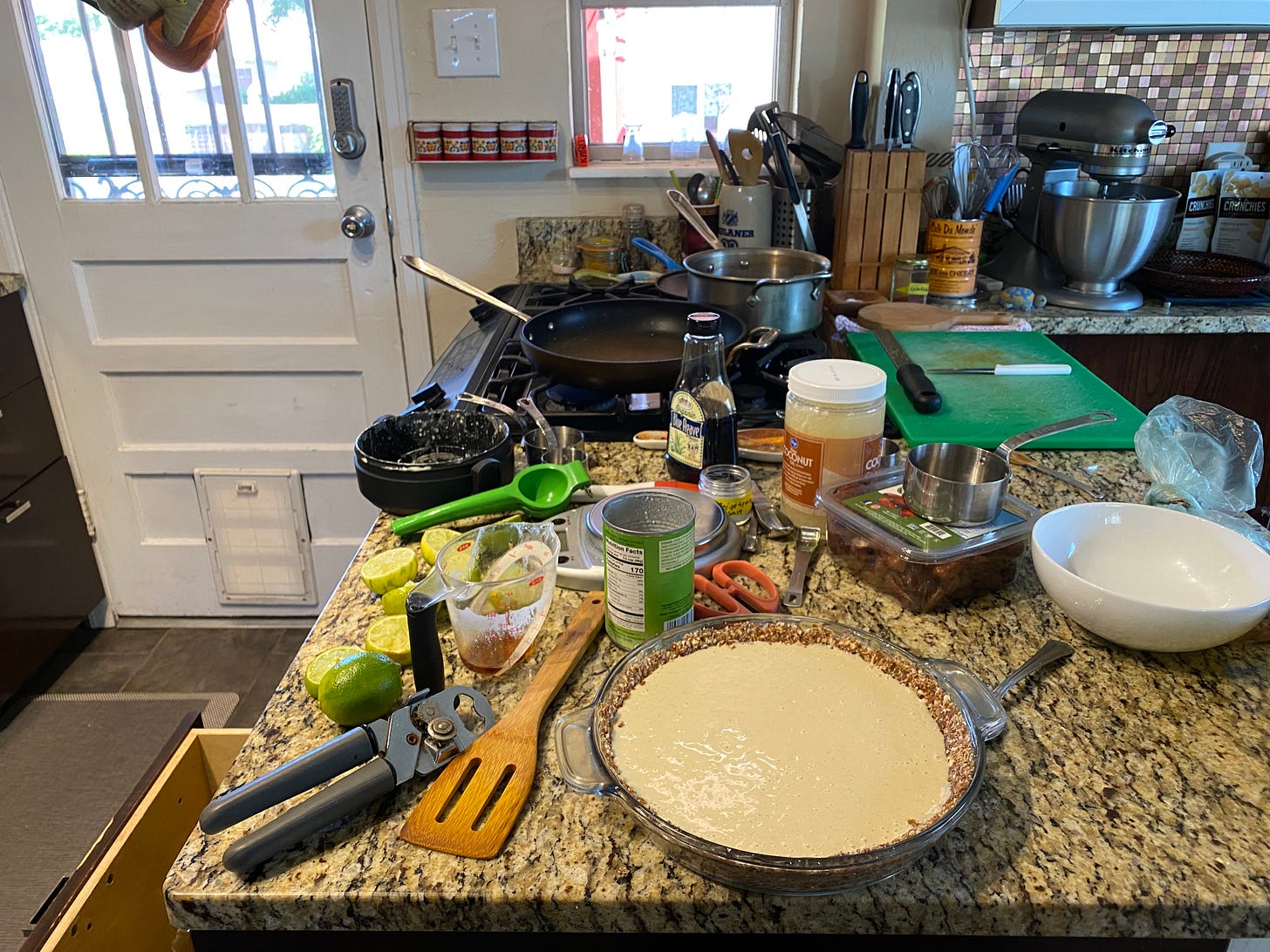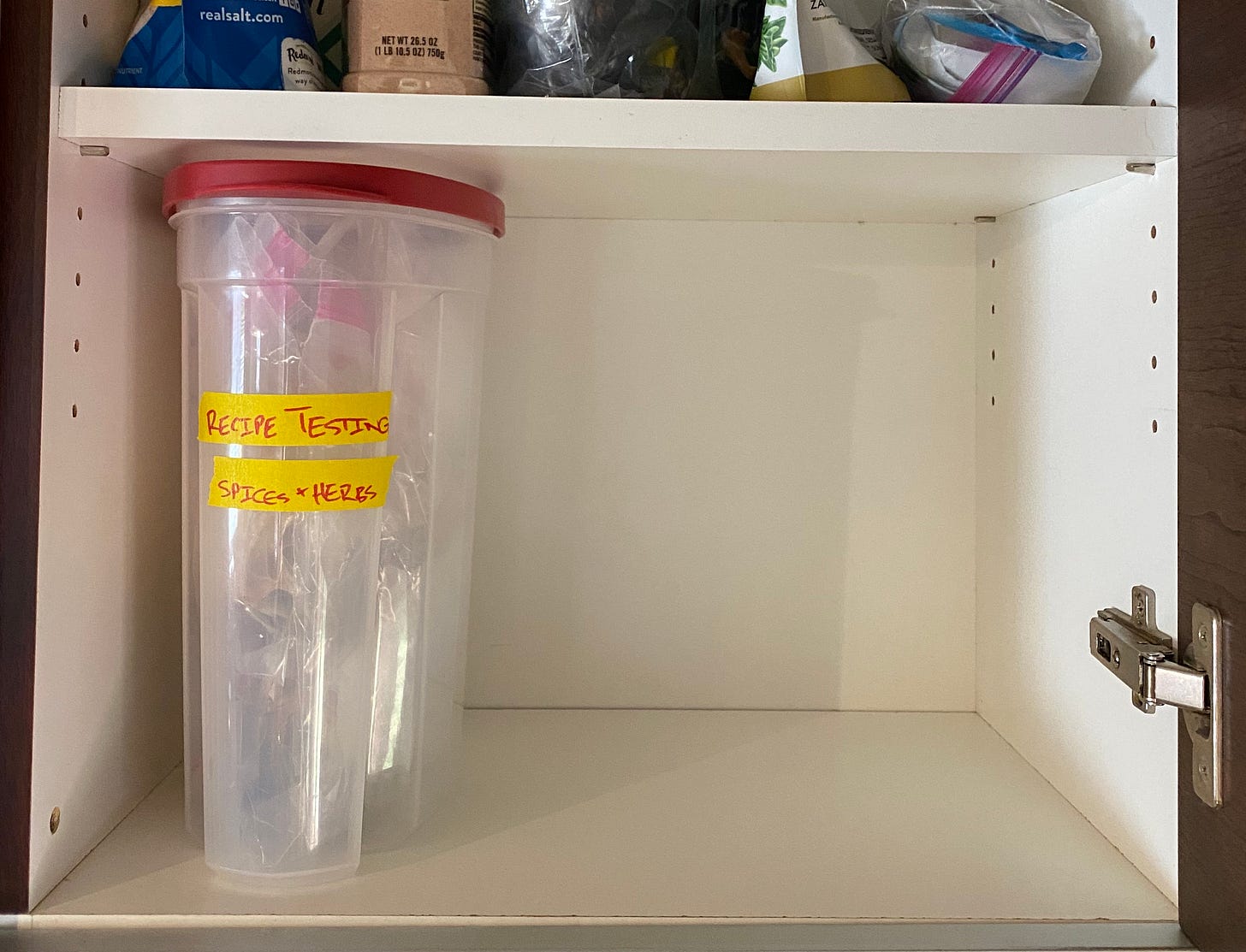What does being a "recipe tester" even mean?
And how it's different from recipe development
Recipe testing for various people and publications has made up a good chunk of my time and income the past several months. As I explain to friends or friends of friends who end up eating the food I make: I’m literally paid to cook and eat, AND the groceries get reimbursed.
Sounds great, right? It is — but (you knew there was a but) — it is still very much work.
Part of me feels the need to write this because I want to clear up any potential for someone to perceive this type of work as the little wife staying at home and cooking a meal for her husband — oh, and she’s barefoot too — but also, that’s a reality for many people who choose it and are genuinely happy. Great for them, truly. But I’m of a generation and moment that lead me to cringe a bit at leading such a gender-conforming life.
(Writing that paragraph reminded of this newsletter from Alicia Kennedy a few months ago, where she describes basically to a T what I’m feeling. I’ve also been reading a lot of Lyz Lenz lately, which is really reaffirming my tendency to yell at dumb men.)
Most of all, I want what I do to be taken seriously. Doesn’t everyone?
First of all — do I need to say this? I guess I do — good recipes are tested. Even if you’re reasonably certain a recipe will work, if it’s not tested in real home kitchen conditions before going out in the world, someone will have issues and that someone will be rightfully upset at having wasted their time, energy, and money. I’m sure you’ve encountered recipes on ye olde internet (and even in published cookbooks, for shame) that have failed you. I have too! The reason they failed is almost certainly not your fault — it’s probably because they weren’t carefully tested.
What does it mean for a recipe to be carefully tested? It means someone made the recipe from start to finish, exactly as written, double and triple checking everything:
Are all the ingredients listed accounted for in the instructions (and vice versa: are there surprise ingredients in the instructions that didn’t make it to the ingredients list)?
Does the recipe call for something slightly ridiculous, like half a bell pepper? (Can we not??)
Is the yield accurate? (This is such an obvious but big thing that is often off; shout out to years working in the Washington Post test kitchen with Bonnie Benwick, queen of checking yields, for teaching me that one.)
If the recipe has various components, do you end up using all of them, or will you have an obnoxious amount of simple syrup leftover that you now have to use elsewhere?
What is a “small” tomato, anyway? Who’s to say if this onion is large or that eggplant is medium?
Does a recipe call for a 14-oz can of something, when that something usually comes in 13.5-oz cans?
Do the volume measurements actually match their ounce or gram equivalents? (Some clients use ingredient equivalent charts to ensure every recipe’s measurements are consistent. I live for this level of accuracy.)
If the recipe includes a filling — say, for dumplings — does the filling amount make enough for the dough? If it’s too much or too little, it’s gotta be adjusted.
How many sprigs of parsley does the shopper need to buy to get 2 chopped tablespoons? (Why do recipes call for ingredients like herbs already chopped? The only people who deal in pre-chopped herbs work in restaurants and pay someone else to chop herbs for them.)
Is the timing within a recipe correct? (Did it take 4 to 5 minutes for firm peaks to form, or did it take 3 minutes 14 seconds?)
Does the recipe give visual cues in addition to timing? Everyone’s stove and ovens are different, so timing will rarely be consistent. You need to tell people what to look, smell, and/or listen for too.
If a total and/or active time estimate is given, is it really accurate, or is the timing only accurate if you’ve made this recipe three times and know what you’re doing, ergo you can make it in 20 minutes and also have the dishes done in five?
This is veering into recipe editing territory (which is also something I do! It’s different than recipe testing, though): if a dish can be avoided or a step streamlined, I will mention it. (Who wants to have more dirty dishes than necessary? The only people who don’t care about that pay someone else to wash their dishes.)
Along similar lines, if a recipe insists you use a stand mixer or food processor, is there possibly an alternative for people who don’t have those? (Or conversely, if a recipe insists you do something by hand, is there an alternative for people who can’t use their hands?)
As I’m reading and working through a recipe, I’m also trying to anticipate questions another cook might have. Something that might seem basic or obvious to me or the recipe developer might not be so simple for another cook. (As hilarious as the above scene from Schitt’s Creek is, ya coulda googled, sweetie.)
In cases when I’m working with a recipe that’s outside my cooking norm — for example, I tested a few Korean recipes recently and my Korean cooking repertoire thus far was limited to gimbap, jajangmyeon, and putting kimchi and gochujang in everything — I’m not going to suggest that an ingredient be explained for the folks who might not be familiar with them. Instead, I will ask if something should be explained more. There’s a difference, isn’t there, in suggesting and asking: maybe the developer doesn’t care to explain because the reader should be capable of looking up something for themselves. Or maybe something really does need a little clarification. It’s ultimately up to them, I’m just here to pose the question.
(Someone wrote an essay within the past few years about the burden of having to constantly explain themselves and their ingredients, which I’d love to reference but can’t find. But I think the overall point was that constantly explaining can make people feel othered, like they don’t belong. And also, if you don’t know something, couldn’t you…look it up for yourself?)
I tested 21 recipes in the past two-ish weeks, which means I had a lot of food that needed to be consumed. The best way to do this, I think, is to have people over: this way I’m essentially being paid to have a party. I also package up treats for neighbors and more friends around the city. Sharing is fun, and getting outside input and more people tasting the results is super helpful for my own feedback.
Sarah posed a few questions about recipe testing last time (thank you!), two of which I think I answered above. The one I haven’t yet addressed: What is your typical budget like, if you do have a typical one? Who covers it?
Depending on the client, I’m paid hourly or per recipe. I have an hourly rate that I won’t go below — which I determined using Chief Executive Auntie/Jennifer Duann Fultz’s freelance rate calculator — so if it’s a per-recipe rate, then it needs to more or less work out to that. (Some of the recipes are more complicated and take longer, but others are much shorter, so they balance each other out.)
I also generally work grocery shopping into the fee, because that counts as time spent working on the recipe, too: if something is difficult to find — which to me means unavailable at either specialty stores or supermarkets — I will note that. (Needing to go to a Middle Eastern market or an H Mart doesn’t count as being difficult.)
As for ingredients, those are almost always reimbursed. (In the extremely rare case they’re not, the fee makes up for it.) Since most clients are repeats, I keep their shelf-stable ingredients reserved to use for their recipes, so I ultimately (I hope) save them money. With things like spices, I get them from the bulk spice section so that I can buy only the amount I need to use. And if I need perishable ingredients, then obviously I will use whatever remains to avoid wasting food.

And that’s recipe testing as a job, baby! Does it mean sometimes I’m up to my eyeballs in vegan cheese and using tiny spoons to divvy up filling so I can determine the exact amount necessary to fill X amount of pasta? Does it mean I have to pick through slimy garlic chives because that’s all the store had and I’m on a deadline? Does my back hurt because I’m standing all day and in my 30s? Do I get tired of cooking? Yes to all of the above. It’s a lot of work. But it’s good work.
If anything above prompted more questions, please ask in comments or by replying to this email and I’d be happy to answer. (I didn’t say how I got into this line of work, for example. It was getting too long already!)
Next time, I’ll share a “recipe” which is more of a method for using up random bits of leftover recipe testing ingredients. It’s honestly probably pretty close to the hash I shared last time, but I’ll figure out a way to zhuzh it up.
P.S. I also listen to music when I recipe test, or I would never get anything done. (If I don’t have something on in the background, my mind wanders aimlessly and I lose all focus.) My playlist is absolutely overplayed, but I can’t listen to new stuff either — otherwise that’s where my focus will be. Brains, so needy.





Really enjoyed this peek behind the curtain for the process that goes into recipe testing!! I would love to hear how you made your way into this line of work, for sure! Also curious, are most of your clients newspapers or online publications? I feel like other than the big shot cookbook authors, first time or more niche or blog-based cookbook authors seem to try to crowdsource some of their recipe testing and it’s hard to imagine they are given a budget to pay professional recipe testers? But definitely a lot of cookbooks could use a lot more testing, based on a lot of Amazon reviews I read about measurements being off or gaps in the directions, etc. Your playlist is very eclectic! I totally get what you mean about not being able to focus when the music is too weird/new. I have a couple tried and true tailored pandora stations that I use for background work music and a lot of the songs repeat frequently enough, which works to make me not notice the words and just occupy my subconscious enough to free up my focus on what I need to focus on.
This was so interesting, Kara! And nothing gets me more than a recipe listing ingredients that are already chopped, cut, etc. Like, no, it's not "just a 20 minute recipe." It's going to take me twice as long since I have to prep everything!